Data Science
- Department Interdisciplinary
- Academic Division The College
- Offerings Minor


We live in a world increasingly driven by data. Data science is a rapidly expanding, multidisciplinary field that draws on statistics, computer science and math, with applications in a wide variety of academic disciplines and industries. We extract meaning from data to learn more about the world and society.
Data Science
The data science minor allows students to complement discipline-specific skills and knowledge with a deeper understanding of how to analyze and extract meaning from data to learn more about the world, society and their discipline. We prepare students to be excellent data analysts in their major disciplines and to be prepared to effectively work with data after graduation. Students:
- Collect and analyze data in a reproducible and ethically responsible manner
- Obtain data through searching, scraping, mining or experimental methods
- Parse, transform and generate wide-ranging data sets for analysis
- Statistically analyze data to summarize, draw inferences and make predictions
- Identify patterns and relationships in datasets using visualization and algorithms
- Communicate data methods and conclusions to diverse audiences
Students trained in data science can apply their skills in a wide variety of ways including serving as central operations manager at Uber (Holley Beasley ’15), working as executive vice president at Microstrategy (Rich Cober ’96), and serving as head of industry at Google (Ames McArdle ’02).
DataCon
W&L hosts DataCon, where people from all corners of industry come to discuss the impacts of data science on industry and the world. Students from all over the university, from biology to sociology to business, participate in the Data Science Program to learn from each other and discover how to ethically learn from data.
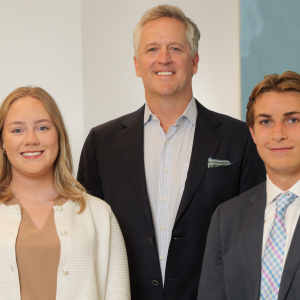
Career Connections
The W&L network is perhaps most illustrative in the early-career assistance and opportunities our alumni provide to current students.
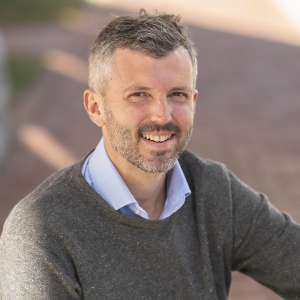
Jon Eastwood to Deliver Lecture in Honor of His Appointment to the William P. Ames Jr. Professorship in Sociology
Eastwood’s talk, titled “Reflections on the Sociology of Cynicism and Distrust,” will be held Feb. 19 in Northen Auditorium.
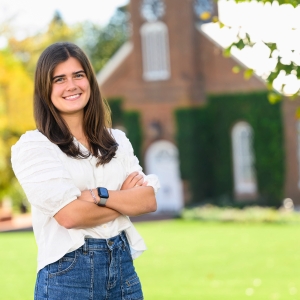
Meet Reagan Reiferson ’26
Reiferson has found her “homes” on campus in her sorority and the Outing Club.

W&L’s Matthew Flynn ’25 Awarded Fulbright to Finland
Flynn will pursue a master’s degree in digital social science at LUT University in Finland.

Sambridhi Tuladhar ’25 to Receive the Global Learning Leadership Award
The accounting major will be presented the award at the Center for International Education awards ceremony on May 27.
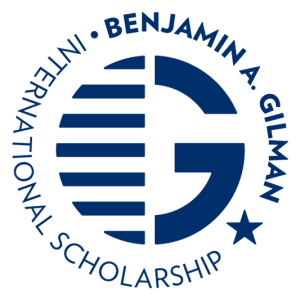
Eight W&L Students Awarded Gilman Scholarships to Study Abroad
This round of recipients marks a record-setting Gilman Scholar cohort for W&L.

W&L’s Anshika Patel ’26 Receives Davis Projects for Peace Grant
Patel plans to expand the reach of Wings of Women, the community-driven initiative she founded in her home country of India.

Meet Elizabeth Marshall ’25
Marshall has embraced many extracurriculars as a math tutor, University Ambassador, equestrian team student-athlete and more.

Justin Davis is the Next Speaker in the Anne and Edgar Basse Jr. Author Talk Series
Davis will deliver a lecture titled “Web Scraping for Research on Novel Data” on campus on March 27.
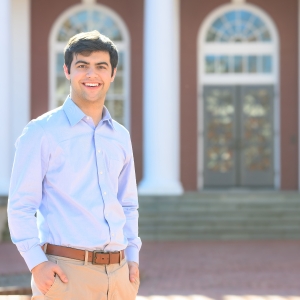
Meet Kam Saalfrank ’25
Mentorship from his major and faculty adviser has helped Saalfrank challenge himself academically and professionally.

W&L Outcomes: Caroline Christianson ’24
Christianson will be working as a research coordinator studying autism in infants and young children.
Sample Courses
At W&L, we believe education and experience go hand-in-hand. You’ll be encouraged to dive in, explore and discover connections that will broaden your perspective.
- Exploring & Visualizing Big Data
- Exploring Social Networks
- Intro to Data Science: Mind Analytics
- Intro to Data Science for Business
- Data in the Humanities
- Modeling & Simulation
BIOL 185
Exploring & Visualizing Big Data
In this course, students learn to use R, a popular open-source programming language and data analysis environment, to interactively explore data. Case studies are drawn from across the sciences and medicine. Topics include data visualization, machine learning, image analysis, geospatial analysis, and statistical inference on large data sets. We also emphasize best practices in coding, data handling, and adherence to the principles of reproducible research.
SOAN 265
Exploring Social Networks
In this introduction to network analysis, students learn some of the major network analysis literature in sociology and related fields and develop their skills as network analysts in laboratory sessions. Social science, humanities, business and public health applications are emphasized.
CBSC 240
Intro to Data Science: Mind Analytics
Psychological tests promise to match you with your soul mate, reveal the hidden depths of your personality and attitudes, and predict your success in college. How would you determine if these promises are being kept? Students build data-science skills while teaming on how to assess a test’s reliability and validity, including tests of abilities, personality, attitudes, and more. No programming experience is required while we use R, a popular open-source programming language, to learn data management, data visualization, model-comparison metrics, and statistical inference in a reproducible and ethically responsible manner.
BUS 314
Intro to Data Science for Business
This course covers organizational concerns related to data science such as artificial intelligence, machine learning, predictive algorithms, Big Data, cloud computing, security and privacy, and the digitization of products and processes. Through readings, students develop a strong conceptual understanding of concepts prior to developing technical proficiency in some of them. Assignments focus on how organizations can improve decision making and create new business opportunities using data science.
DCI 102
Data in the Humanities
This course introduces students to the creation and visualization of data in humanities research. The community and set of practices that is digital humanities encourages fluency in media beyond the printed word such as text mining, digital curation, data visualization, and spatial analysis. Readings and discussions of theory complement hands-on application of digital methods and computational thinking. While the objects of our study come primarily from the humanities, the methods of analysis are widely applicable to the social and natural sciences.
CSCI 256
Modeling & Simulation
This course covers standard practices and applications of modeling and simulation. We explore ways to model complex systems that incorporate disciplines of biology, chemistry and physics. Students learn critical-thinking skills when reading, comprehending and analyzing real-world systems for which they then create models.
Meet the Faculty
At W&L, students enjoy small classes and close relationships with professors who educate and nurture.


Gregg Whitworth
Associate Professor of Biology, Data Science Program Head
Whitworth’s courses include Data Science: Visualizing and Exploring Big Data and The Molecular Mechanics of Life.




Jonathan Eastwood
Department Head, Sociology and Anthropology; Professor of Sociology
Professor Eastwood is a social theorist who also has a strong interest in quantitative methods. He teaches seminars on classical and contemporary theory as well as a series of courses that train students how to use quantitative and computational tools to answer sociological questions.


Bright Frimpong
Assistant Professor of Business Administration


Lingshu Hu
Assistant Professor of Business Administration
- P: 540-458-8383
- E: lhu@wlu.edu
With a PhD in journalism focusing on computational methods and a graduate certificate in AI and Machine Learning, Professor Hu’s primary teaching interests include making data analytics accessible to students in the social sciences and helping students master storytelling skills with data analytics and visualization.


Dan Johnson
Professor of Cognitive and Behavioral Science
Johnson’s courses include Psychology Mythbusters and Introduction to Data Science: Mind Analytics. His lab uses computational models and empirical data to investigate the mechanisms underlying creativity processes like the generation of novel ideas.


Keri M. Larson
Assistant Professor of Business Administration
- P: 540-458-8601
- E: larsonk@wlu.edu
Larson teaches courses that help students learn to understand and use data in areas of management. She has researched the analytics of unstructured textual data to support organizational decision making.


David Marsh
Professor of Biology
- P: 540-458-8176
- E: marshd@wlu.edu
Marsh teaches Intro to Behavioral Ecology, Microbiome, Field Herpetology, Animal Behavior and Statistics for Biology and Medicine. His research includes effects of climate change on endemic mountaintop salamanders, effects of roads and land use on frog and toad populations across the Eastern and central U.S., and population dynamics of terrestrial salamanders.


Sybil Prince Nelson
Assistant Professor of Mathematics
Prince Nelson ’01 teaches courses in calculus, probability and statistics. Her research is focused on creating tree-based models for classifying and predicting outcomes from complex data.


Holly Shablack
Assistant Professor of Cognitive and Behavioral Science
On Leave
Shablack’s courses include Heath Psychology, Introduction to Data Science: Trends over time, and Emotions, Language, and Culture. Her research examines how our language and various socio-cultural factors influence our attitudes, emotions, physical and mental health, and behavior.
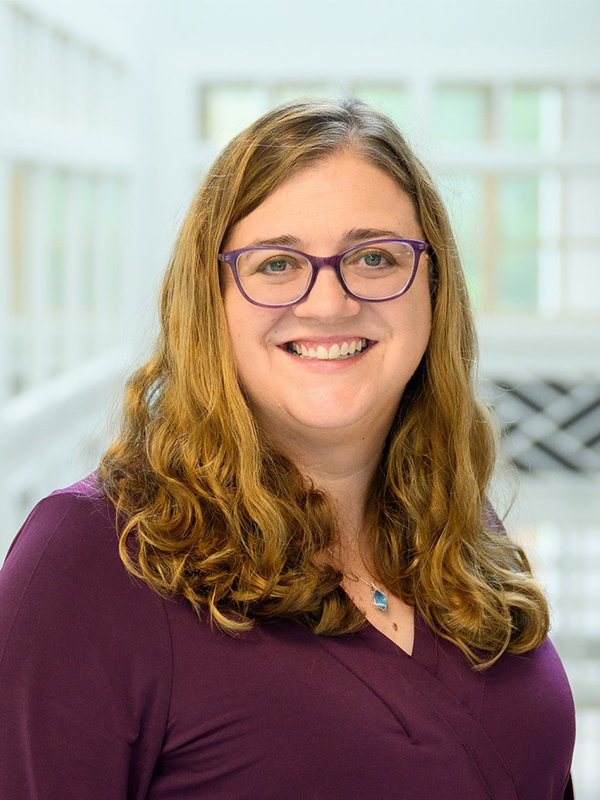

Sara Sprenkle
Associate Professor of Computer Science and Department Head
Sprenkle teaches courses in programming, software development, and upper-level electives in software engineering. Her research focuses on automatically testing web applications to make sure they are behaving properly.


Natalia Toporikova
Associate Professor of Biology
Professor Toporikova’s courses include Biological Clocks and Rhythms, The Architecture of Living Systems, Dynamics of Biological Systems and Pregnancy: A Kiss in Time? In her research, she applies methods of computational modeling to study a wide range of biological systems. Some recent projects include neural control of breathing, pregnancy initiation in rats, and daily circadian cycle.












